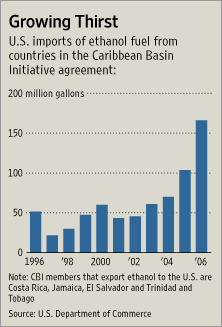What happens when you mandate use of ethanol and heavily tax its importation?
There was an amusing article in last Friday’s Wall Street Journal ($$$) about a curious loophole in U.S. oil import tariffs. It focuses on a remarkable boomlet of U.S. imports of ethanol from the Caribbean that is not the result of the usual sources of comparative advantage:
< |
These biofuel entrepreneurs won’t actually make ethanol from Caribbean sugar cane, even though sugar makes the best base for the fuel. Instead they’ll just import it from ethanol powerhouse Brazil, and process it here. Then they’ll try to cash in on the islands’ sweet tariff status: an exemption from a 54-cents-a-gallon U.S. tariff on ethanol processed anywhere else….
The Caribbean sugar industry is so antiquated that it can’t produce the fuel competitively from its own cane fields. Instead, Caribbean companies take on a middle step in the production process: They dehydrate the ethanol from its original state, then ship it to U.S. refiners, which add gasoline to make the fuel useable in American cars. The dehydrating meets the U.S. requirement that products be “substantially transformed” in Caribbean Basin countries, if they don’t originate there, to escape tariffs.
Some of us had hoped that President Bush’s visit to Brazil might have signaled that a new era of common sense could have arrived in Washington. But alas, it was not to be. The Washington Post reported that “Bush on Friday refused to discuss Lula’s desire to reduce a 54 percent tariff on imported Brazilian sugar-cane ethanol”, and the
Wall Street Journal claimed that “a U.S. government fact sheet specified that Friday’s initiative ‘does not include discussion of United States trade, tariffs or quotas.'”
You may like ethanol subsidies and mandates. Or you may like ethanol tariffs. But if you claim to like them both, I’m inclined not to take you seriously about either one, since the tariff directly undermines the effectiveness of the mandate. Unless perhaps your policy objective has nothing to do with meeting U.S. energy needs and everything to do with farm politics.
If you’re an economist, the idea of importing dehydrated Brazilian ethanol from the Caribbean just leaves you shaking your head about the craziness of U.S. energy policy. Or, if you’re Senator Chuck Grassley (R-IA), it leaves you thinking we really need to close that Caribbean ethanol-tariff loophole.
Technorati Tags: ethanol,
ethanol subsidies,
ethanol imports
One would have hoped that the so-called energy bill would have dealt with this as the national security issue it is. That it was not is extremely frustrating, but no real surprise, especially considering how our elected officials are ignoring the impending financial crises of S.S. and Medicare.
The correct free market answer is to detest subsidies, mandates and tariffs alike.
Perhaps this should be a lesson for those considering supporting a gasoline or carbon taxes – once you start to make industrial policy, mischief WILL follow.
Of course, not all industrial policies are so misguided or prone to abuse and rent seeking in their execution. The pragmatic citizen will have to judge whether the good done will be worth the inevitable payouts to the unproductive. Can we trust our elected officials to not sell their votes?
This is just one more example that makes you wonder why the press so dutifully writes about Bush’s efforts on “free trade” agreements implying that they serve a good purpose. There’s nothing free about them. They are just negotiations between various interest groups.
One could make an argument that being generous in this regard to the Caribbean helps offset other policies that have been counter-beneficial to a region that lies so close us, and for the most part is quite poor.
Blog Review 170
Both EU Referendum and RealClearPolitics point to the true but little understood fact that regulations to make us safer can make us less safe. Bag spots a quango making waste with our money. Used tea bags are apparently defined as food thrown away. Wat…
Bush has not been a free market president.
Has anyone followed the money? What Caribbean countries are profiting and who are the investors in the import companies? This could not have been an accident because its use was actually given definition, so Grassley is simply grand-standing. There is more to this than meets the eye.
Well, I’m against subsidies and tariffs on ethanol and continually amazed at the political power that the farm lobby has.
As a Brazilian economist, I have been thinking a little about this issue lately… If this loophole is closed, imposing a mandate for the use of ethanol in the US while imposing a tariff on the imports from the main producer is equivalent to taxing the Brazilian producers to fund the American change to ethanol.
Our productivity gains (nevermind the amazing sunk costs involved in developing the technology in the first place) can then be taken by the US Government, and it can, for once, look environmentally responsible.
On the other hand, if the loophole isn’t closed, our productivity gains are taken by the private sector. One can only hope that it’s subsidiaries of Brazilian producer companies (which should logically be paying attention to these things, right?) that have been doing that “triangular trade” described…
Sometimes it gets just tiring, you know?